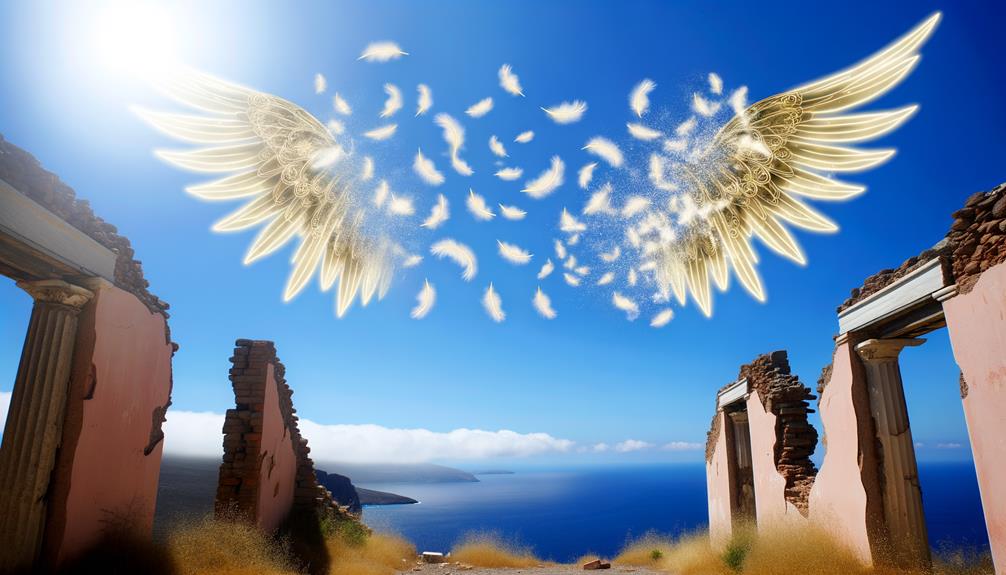Meaning of the Name Icarus
The name Icarus, deriving from the Greek 'î karos', is steeped in mythology and symbolizes the dual themes of ambition and the tragic fate of overreaching. Icarus, son of Daedalus, is renowned for his ill-fated flight where he soared too close to the sun, causing his wax-crafted wings to melt and leading to his downfall.
This name encapsulates the essence of human aspiration alongside hubris, serving as a cautionary figure against the perils of excessive ambition. The story of Icarus offers profound insights into human nature and the consequences of failure to heed prudent guidance.
To grasp the full scope of Icarus' symbolic relevance, a deeper exploration into both ancient tales and their modern interpretations is essential.

Key Takeaways
- The name Icarus originates from Greek mythology and the Greek word 'īkāros'.
- Icarus is symbolic of ambition and hubris leading to downfall.
- Icarus was the son of Daedalus, known for his tragic flight too close to the sun.
- The story of Icarus highlights the consequences of overreaching ambition.
- Icarus' myth serves as a cautionary tale about the perils of overconfidence and imprudence.
Origins in Greek Mythology
The name Icarus finds its origins in Greek mythology, where it is intrinsically linked to the tragic tale of a young man's ill-fated flight.
Etymologically, the name Icarus (Greek: Ἴκαρος) is derived from the Greek word 'îkaros,' which possibly means 'follower.' This nomenclature is suffused with symbolic resonance, reflecting the narrative's themes of ambition and hubris.
Within the mythological context, Icarus is the son of the master craftsman Daedalus, and his name has come to epitomize the peril of overreaching human ambition. The myth serves as an allegorical caution, encapsulating the potential consequences of defying natural limitations.
Consequently, the name Icarus is not merely a label but a profound emblem of the interplay between aspiration and downfall in ancient Greek lore.
The Story of Icarus
The tale of Icarus is intrinsically linked to the ingenuity of his father, Daedalus, who crafted wings from feathers and wax to escape their imprisonment.
Despite Daedalus' warnings, Icarus' desire for freedom led him to soar too close to the sun, resulting in the melting of his wings and subsequent fall into the sea.
This narrative encapsulates themes of hubris and the catastrophic repercussions of overreaching ambition.
Daedalus' Ingenious Invention
Crafting an ingenious set of wings from feathers and wax, Daedalus epitomized the pinnacle of human creativity and ambition. His invention was not merely an escape mechanism but a demonstration of the boundless ingenuity of the human spirit.
This meticulous process involved:
- Selection of materials: Daedalus chose feathers, a natural, lightweight yet strong material.
- Wax as an adhesive: He utilized wax, which provided flexibility and adhesive strength.
- Structural design: The wings were constructed to mimic the anatomy of birds, ensuring functionality.
- Attachment method: Straps were designed to secure the wings to the body, allowing for human flight.
Through these steps, Daedalus' creation symbolized the delicate balance between innovation and nature's principles, laying the groundwork for the story's ensuing events.
The Forbidden Flight
Setting off on their flight from Crete, Icarus and Daedalus faced a perilous journey that would ultimately underscore the timeless tension between human ambition and the immutable laws of nature.
Crafted from feathers and wax, Daedalus' wings symbolized human ingenuity and the yearning for freedom. Yet, this innovative escape plan from King Minos' labyrinth revealed the inherent risks of overreaching.
Daedalus instructed his son to maintain a moderate altitude, warning against the dangers of both the scorching sun and the engulfing sea. This guidance was not merely practical but emblematic of the delicate balance between aspiration and limitation.
The flight itself became a poignant metaphor for the broader human condition, encapsulating the perilous pursuit of transcendence.
Tragic Downfall Consequences
Icarus' tragic downfall serves as a profound allegory for the consequences of hubris, illustrating the peril that accompanies the disregard for natural limitations. His overambitious flight, driven by the euphoria of newfound freedom, culminated in his demise, underscoring the inherent risks of overstepping boundaries. This myth encapsulates several critical lessons:
- Hubris and Overconfidence: Icarus' defiance of his father's warnings epitomizes the dangers of excessive pride.
- Consequences of Ignorance: His ignorance of the sun's heat led to the melting of his wax wings.
- Natural Law: The tale highlights the inevitability of natural laws and their repercussions.
- Parental Guidance: Daedalus' advice symbolizes the protective wisdom often ignored by the youthful.
These themes continue to resonate in contemporary discussions on human ambition and prudence.
Symbolism in Mythology
The myth of Icarus is rich with symbolism, encapsulating themes of hubris and unchecked ambition, the allure of freedom through flight, and the inevitable consequences of overreach. By examining these motifs, one can appreciate how Icarus serves as a cautionary figure whose tragic fate underscores the perils of excessive pride and the human desire to transcend natural limits.
This analysis will illuminate the enduring relevance of Icarus's story in contemporary contexts, where similar themes continue to resonate.
Hubris and Ambition
Embodying the quintessential warning against hubris, the myth of Icarus serves as a potent symbol of the perils associated with overreaching ambition. The tale cautions against the dangers of defying natural limits and illustrates the catastrophic outcomes of excessive pride. Icarus, despite his father Daedalus's warnings, flew too close to the sun, causing his waxen wings to melt and leading to his tragic fall.
Key aspects of the myth highlight:
- Overconfidence: Ignoring wise counsel and believing oneself invincible.
- Imprudence: Acting recklessly without considering potential consequences.
- Disregard for boundaries: Defying natural or societal limits to achieve personal desires.
- Tragic downfall: The inevitable failure resulting from unchecked ambition.
Through these elements, the myth underscores the timeless lesson of respecting inherent limitations.
Freedom and Flight
While the myth of Icarus serves as a stark admonition against hubris and overreaching ambition, it simultaneously evokes deeper themes of freedom and the human yearning for transcendence through the symbolism of flight.
The act of flight in the myth encapsulates the quintessential human aspiration to break free from earthly constraints and attain a sense of liberation. Icarus' ascent towards the sun represents an unbridled quest for autonomy and the pursuit of an elevated state of being.
This yearning for freedom, though fraught with peril, underscores a fundamental aspect of the human experience: the drive to explore new horizons, both literally and metaphorically. Ergo, the myth intricately weaves caution with the allure of boundless potential.
Consequences of Overreach
In mythological narratives, the tale of Icarus serves as a profound allegory for the consequences of overreach, illustrating the perilous outcomes that often accompany the transgression of natural boundaries. Icarus' fatal ascent towards the sun, ignoring his father Daedalus' warnings, encapsulates the hubris and reckless ambition that can lead to one's downfall. This mythological episode underscores several key themes:
- Hubris: The excessive pride and self-confidence that blind individuals to potential dangers.
- Disobedience: The failure to heed wise counsel, resulting in catastrophic consequences.
- Boundaries: The importance of recognizing and respecting natural and societal limits.
- Tragic Flaws: The inherent imperfections that can precipitate a character's demise.
The story of Icarus remains a timeless reminder of the inherent risks of overreach.
Icarus as a Cautionary Tale
The myth of Icarus serves as a profound cautionary tale, illustrating the perilous consequences of hubris and the reckless pursuit of ambition beyond one's limits.
Icarus, equipped with wax wings crafted by his father Daedalus, ignored warnings and ascended too close to the sun. The resultant melting of his wings symbolizes the downfall that awaits those who disregard prudent counsel in favor of overreaching aspirations.
This narrative underscores the fragile balance between ambition and humility, warning against the dangers of excessive pride and the temptation to transcend human boundaries. It serves as a timeless reminder that wisdom often lies in recognizing and respecting one's limitations, thereby avoiding catastrophic outcomes.
Literary References
Numerous literary works across centuries have invoked the myth of Icarus to explore themes of ambition, hubris, and the tragic consequences of human overreach. This myth serves as a potent allegory for the human condition, compelling authors to ponder the limits of aspiration and the perils of defiance.
Through various retellings and references, Icarus has permeated diverse genres and epochs, continually resonating with readers.
- James Joyce's 'A Portrait of the Artist as a Young Man': Represents the protagonist's quest for artistic freedom.
- W.H. Auden's 'Musée des Beaux Arts': Highlights societal indifference to individual suffering.
- Anne Sexton's 'To a Friend Whose Work Has Come to Triumph': Examines the duality of success and failure.
- John Milton's 'Paradise Lost': Echoes the themes of ambition and downfall.
Each reference enriches the narrative complexity, underscoring Icarus' enduring relevance.
Depictions in Art
Artists throughout history have vividly captured the myth of Icarus, employing a variety of mediums to explore its complex themes of ambition and downfall.
The Renaissance painter Pieter Bruegel the Elder, in his work 'Landscape with the Fall of Icarus,' subtly integrates Icarus's tragedy into a bucolic scene, emphasizing human indifference to individual hubris.
Similarly, Henri Matisse's 'Icarus' in his 'Jazz' series uses bold colors and abstract forms to symbolize the soaring ambition and subsequent demise of the mythical figure.
In sculpture, Auguste Rodin's 'The Fall of Icarus' encapsulates the dramatic moment of descent, capturing the vulnerability and pathos of the character.
These varied artistic interpretations underscore the enduring resonance of Icarus's tale across different historical periods.
Icarus in Modern Culture
In contemporary culture, the myth of Icarus has been reinterpreted and referenced across various forms of media, serving as a potent symbol of human aspiration and the peril of overreaching ambition. This ancient narrative has permeated modern literature, film, music, and visual art, often illustrating the consequences of hubris and the limits of human endeavor.
Literature:
Authors like James Joyce and William Faulkner have woven Icarus into their works to explore themes of existential struggle.
Film:
Movies such as 'The Icarus Line Must Die' evoke the myth's motifs to comment on contemporary issues.
Music:
Bands like Bastille and Iron Maiden have referenced Icarus in their lyrics.
Visual Art:
Modern artists like Henri Matisse and Pablo Picasso have depicted Icarus, emphasizing its timeless resonance.
Psychological Interpretations
The myth of Icarus, while pervasive in modern culture, also offers profound psychological insights into the human condition, particularly regarding themes of ambition, risk-taking, and the parent-child relationship.
From a psychological perspective, Icarus embodies the inherent tension between youthful exuberance and the wisdom of parental guidance. His reckless flight illustrates the archetypal struggle of individuals striving to transcend limitations, often at the expense of ignoring prudent advice.
Moreover, the myth underscores the dual nature of ambition: it can be both a driving force for achievement and a harbinger of downfall.
The relationship between Daedalus and Icarus exemplifies the complexities of parental influence, highlighting the delicate balance between fostering independence and ensuring safety.
This narrative remains a potent symbol in understanding human psychology.
Lessons From Icarus
Numerous lessons can be gleaned from the myth of Icarus, each offering a nuanced perspective on the interplay between human ambition and the consequences of hubris. The narrative underscores the delicate balance between aspiration and overreach, warning against the peril of ignoring wise counsel.
Key takeaways include:
- Hubris Leads to Downfall: Icarus' disregard for his father Daedalus' advice exemplifies how excessive pride can precipitate one's ruin.
- Moderation is Essential: The myth emphasizes the virtue of moderation, advising against extremes.
- Consequences of Disobedience: Icarus' tragic end serves as a cautionary tale about the repercussions of disobeying prudent guidance.
- The Duality of Ambition: While ambition can be a driving force for progress, unchecked ambition can lead to catastrophic outcomes.
Conclusion
In summation, the name Icarus, rooted in Greek mythology, offers a rich tapestry of meanings, from the ancient tale of ambition and hubris to its cautionary symbolism.
Literary references and artistic depictions further underscore its enduring relevance.
Modern culture and psychological interpretations continue to explore its lessons.
The story of Icarus serves as a timeless reminder of the perils of overreaching, the consequences of disobedience, and the eternal human quest for understanding one's limits.






